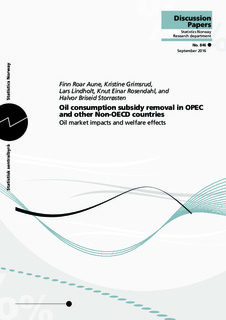| dc.contributor.author | Aune, Finn Roar | |
| dc.contributor.author | Grimsrud, Kristine | |
| dc.contributor.author | Lindholt, Lars | |
| dc.contributor.author | Rosendahl, Knut Einar | |
| dc.contributor.author | Storrøsten, Halvor Briseid | |
| dc.date.accessioned | 2018-09-11T08:16:59Z | |
| dc.date.available | 2018-09-11T08:16:59Z | |
| dc.date.issued | 2016-09-19 | |
| dc.identifier.issn | 1892-753X | |
| dc.identifier.uri | http://hdl.handle.net/11250/2561908 | |
| dc.description.abstract | This paper studies the oil market effects of phasing out oil consumption subsidies in the transport sector.
Welfare effects in different countries are also examined. We investigate potential feedback mechanisms of oil subsidy removal via lower oil prices in the global oil market, which may stimulate oil consumption in other regions. An intertemporal numerical model of the international oil market is applied, where OPEC-Core producers have market power. The major subsidizers of oil are OPEC countries, and we find that the effects of subsidy removal here are quite pronounced. Consumption of oil in the transport sector of OPEC countries declines significantly. As a result, the global oil price falls slightly, and other regions increase their oil consumption to some degree. Although OPEC consumers are worse off by the subsidy removal, total welfare in OPEC increases due to higher profits from oil production. | nb_NO |
| dc.language.iso | eng | nb_NO |
| dc.publisher | Statistisk sentralbyrå | nb_NO |
| dc.relation.ispartofseries | Discussion Papers;No. 846 | |
| dc.subject | Oljeforbruk | nb_NO |
| dc.subject | Velferdsmidler | nb_NO |
| dc.title | Oil consumption subsidy removal in OPEC and other Non-OECD countries Oil market impacts and welfare effects | nb_NO |
| dc.type | Working paper | nb_NO |
| dc.subject.nsi | VDP::Samfunnsvitenskap: 200::Økonomi: 210::Samfunnsøkonomi: 212 | nb_NO |
| dc.source.pagenumber | 39 s. | nb_NO |
